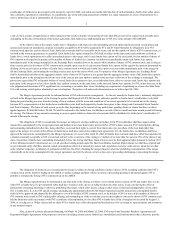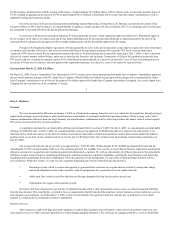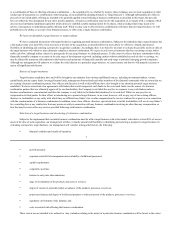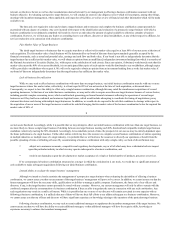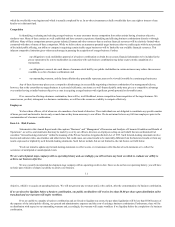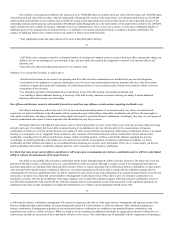Jamba Juice 2006 Annual Report Download - page 13
Download and view the complete annual report
Please find page 13 of the 2006 Jamba Juice annual report below. You can navigate through the pages in the report by either clicking on the pages listed below, or by using the keyword search tool below to find specific information within the annual report.
threshold. Accordingly, while it is possible that we may attempt to effect our initial business combination with more than one target business, we are more
likely to choose a single target business if deciding between one target business meeting such 80% threshold and comparable multiple target business
candidates collectively meeting the 80% threshold. Consequently, it is probable that, unless the purchase price consists substantially of our equity, we will
have the ability to complete only the initial business combination with the proceeds of the initial offering. Accordingly, the prospects for our success may be:
• solely dependent upon the performance of a single business, or
• dependent upon the development or market acceptance of a single or limited number of processes or services.
In this case, we will not be able to diversify our operations or benefit from the possible spreading of risks or offsetting of losses, unlike other entities which
may have the resources to complete several business combinations in different industries or different areas of a single industry.
Because of our limited resources and the significant competition for business combination opportunities, we may not be able to consummate an
attractive business combination.
We have encountered and expect to encounter intense competition from other entities having a business objective similar to ours, including venture
capital funds, leveraged buyout funds and operating businesses competing for acquisitions. Many of these entities are well established and have extensive
experience in identifying and effecting business combinations directly or through affiliates. Many of these competitors possess greater
16
technical, human and other resources than we do and our financial resources will be relatively limited when contrasted with those of many of these
competitors. While we believe that there are numerous potential target businesses that we could acquire with the net proceeds of the initial public offering, our
ability to compete in acquiring certain sizable target businesses will be limited by our available financial resources. This inherent competitive limitation gives
others an advantage in pursuing the acquisition of certain target businesses. In addition, we may not have enough cash available from funds outside of the
trust account to make deposits or fund a “no-shop” provision in connection with a particular business combination which may cause us to be at a competitive
disadvantage in pursuing the acquisition of target businesses. Further, the obligation we have to seek stockholder approval of a business combination may
delay the consummation of a transaction, and our obligation to convert into cash the shares of common stock held by public stockholders in certain instances
may reduce the resources available for a business combination. Additionally, our outstanding warrants, and the future dilution they potentially represent, may
not be viewed favorably by certain target businesses. Any of these obligations may place us at a competitive disadvantage in successfully negotiating a
business combination.
We may be unable to obtain additional financing, if required, to complete a business combination or to fund the operations and growth of the
target business, which could compel us to restructure the transaction or abandon a particular business combination.
Although we believe that the net proceeds of the initial public offering are sufficient to allow us to consummate a business combination, we cannot
currently ascertain the capital requirements for any particular transaction. If the net proceeds of the initial public offering prove to be insufficient, either
because of the size of the business combination or the depletion of the available net proceeds in search of a target business, or because we become obligated to
convert into cash a significant number of shares from dissenting stockholders, we will be required to seek additional financing. We cannot assure you that
such financing would be available on acceptable terms, if at all. To the extent that additional financing proves to be unavailable when needed to consummate a
particular business combination, we would be compelled to restructure the transaction or abandon that particular business combination and seek an alternative
target business candidate. In addition, it is possible that we could use a portion of the funds not in the trust account to make a deposit, down payment or fund
a “no-shop” provision with respect to a particular proposed business combination, although we do not have any current intention to do so. In the event that we
were ultimately required to forfeit such funds (whether as a result of our breach of the agreement relating to such payment or otherwise), we may not have a
sufficient amount of working capital available outside of the trust account to conduct due diligence and pay other expenses related to finding a suitable
business combination without securing additional financing. If we were unable to secure additional financing, we would most likely fail to consummate a
business combination in the allotted time and would be forced to liquidate. In addition, if we consummate a business combination, we may require additional
financing to fund the operations or growth of the target business. The failure to secure additional financing could have a material adverse effect on the
continued development or growth of the target business. None of our officers, directors or stockholders is required to provide any financing to us in connection
with or after a business combination.
Our outstanding warrants may have an adverse effect on the market price of common stock and make it more difficult to effect a business
combination.
In connection with the initial public offering, as part of the units, we issued warrants to purchase 17,250,000 shares of common stock. We will also
issue an option to purchase 750,000 units to the representative of the underwriters which, if exercised, will result in the issuance of an additional 750,000
warrants. To the extent we issue shares of common stock to effect a business combination, the potential for the issuance of substantial numbers of additional
shares upon exercise of these warrants could make us a less attractive acquisition vehicle in the eyes of a target business as such securities, when exercised,
will increase the number of issued and outstanding shares of our common stock and reduce the value of the shares issued to complete the business
combination. Accordingly, our warrants and options may make it more difficult to effectuate a business combination or increase the cost of the target business.
Additionally, the sale, or even the possibility of sale, of the shares underlying the warrants could have an adverse effect on the market price for our securities
or on our ability to obtain future public financing. If and to the extent these warrants and options are exercised, you may experience dilution to your holdings.
17


